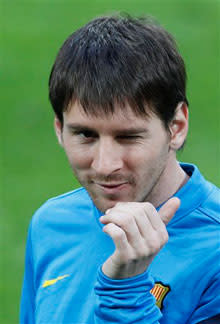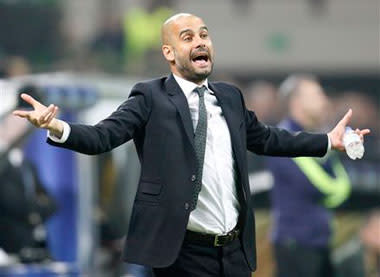Barcelona's scoreless draw against AC Milan in the Champions League quarterfinals is not a loss
The steps Barcelona took toward another Champions League final were not the most delicate Wednesday, yet it was still impossible to shake the sense of inevitability that accompanies this team whenever it reaches the latter stages of its favorite competition.
Barca and its players have come to regard the Champions League trophy as their own personal property in recent times, winning it two of the past three seasons and three of the past six with dominance and style.
A 0-0 draw at AC Milan in the first leg of this year's quarterfinal was without the thrills we have come to expect of Lionel Messi and Co. After all, Messi scored six goals in a 10-2 aggregate score rout of Bayer Leverkusen in the previous round.
Even so, heading back to its fortress of Catalonia with scores even gives the Spanish side a huge advantage that it, and most of the soccer world, will expect to be exploited in the second leg next week.
Business as usual?
Not so fast.
While Barca looks as forceful as ever in the Champions League, its domestic form this campaign has left much to be desired, and a six-point gap behind Real Madrid could be too much to overcome in the Liga title race.
That in itself need not be a huge indicator of a downturn, especially in Europe, but it might mean that Barca's window of success, at least in its current form, is closing.
Central to all that is coach Pep Guardiola, the mastermind behind the success at Barca the last four years.
Guardiola's contract is up at the end of the season, and his future gets more uncertain with each passing week. It has been widely reported that he recently met with Chelsea owner Roman Abramovich, an encounter where the Russian oil billionaire – who has installed Roberto Di Matteo as coach on a temporary basis – sounded him out about a summer move to west London.
There is also talk that Guardiola, who has made no secret that he is tiring of the political machinations behind the scenes at the Camp Nou, could take a sabbatical of at least one year.
It is no shock that Messi and his cohorts Xavi and Andres Iniesta get the bulk of the credit at Barca, especially when you consider the fleet-footed trickery the little Argentinean conjures up on a weekly basis.
Yet the concept that Guardiola merely writes the names of his star-studded lineup on the team sheet and sends them out to do their thing is deeply flawed. He is the one who has kept it all together at Barca, a club that at many points in its history has underperformed because various coaches could not manage the egos in the camp.
Despite the extraordinary gifts he has to pick from, Guardiola has managed to foster a collective spirit, one that shows little sign of dwindling. It cannot be disputed that having Messi is a huge competitive advantage – but only if he is given the system and flexibility to flourish. Five managers of the Argentina national team, dating back six years, have been unable to solve the riddle of how to get the best out of Messi.
More than anything, Guardiola deserves credit for his ability to let the little man's greatness shine through.
Under Guardiola, Barca has stamped its authority on Europe. Before his arrival in summer 2008, the Champions League was in danger of becoming an English stranglehold, so much so that UEFA chief Michel Platini considered and eventually implemented new financial rules aimed at curbing the Premier League's strength.
But Guardiola showed Barca how to use its superior technical ability to pick through the physicality of English teams, shown most noticeably in a pair of Champions League final destructions of Manchester United in 2009 and 2011.
Given how the team ended last season, by defeating United at London's Wembley Stadium to be crowned kings of Europe once more, it is remarkable that in its own league this season it has suffered defeats to sides such as Getafe and Osasuna, as well as a string of draws.
It is only by beating Madrid in their first La Liga head-to-head matchup that the gap has remained somewhat manageable, although Real and Jose Mourinho are still a strong favorite to lift the Spanish title.
But Barca still knows how to get up for the big games and Wednesday was proof of that. Milan came to fight and scrap and spoil and frustrate them, even with the game being played at the Italian club's San Siro stadium.
It was with aggression, bloody-mindedness and physicality that an Italian side, Inter Milan, inflicted Barca's last defeat in the Champions League knockout stages (in the semifinals in 2010). Now, though, Barca is even tougher and smarter and refused to be outwitted here.
Although Robinho and Zlatan Ibrahimovic had good scoring chances for the home side, Barca dominated possession and was unfortunate to be denied a penalty when Alexis Sanchez was brought down by Christian Abbiati.
Four games sit between them and another Euro crown and they are an overwhelming favorite even if Real is surging in Spain and Bayern Munich has the added incentive of the Champions League final being played in its own stadium. The theory remains, with justification, that if Barca plays its best it can't be stopped.
But what next?
Perhaps the talk of walking away is all a ruse from Guardiola, a ploy to strengthen his position at the club so he doesn't have to jump through so many mysterious political hoops behind the scenes. Either way, he is no longer happy to be a mere foot soldier and something is going to change at Barca.
A switch to new pastures, once unthinkable, is now less so. Guardiola is no longer the simple boy from this proud region who sang Catalan folk songs and dreamed of independence from Spain. Those political leanings may still be in place, but Guardiola has grown with this job and had his eyes widened to bigger possibilities.
He fiercely resisted an overseas switch until late in his playing career, but now by all accounts he would actually welcome the chance to test himself in a new location, with a new language.
Chelsea's fiscal firepower makes it a possibility, and Abramovich would give him an enormous transfer treasure trove with which to go into battle. The sabbatical option is a tricky one, and indications are that the Barca hierarchy would be hard-pressed to sign off on such a situation, where an interim manager could come in for 12 months only.
The third choice is for him to stick around, but with increased influence on the decisions involving new signings, and with fewer requirements to explain his every move to senior figures on the board. Changes will need to be made at some point and while Messi will remain the cornerstone, Xavi and Iniesta are not getting any younger.
Brazil's young superstar Neymar could be one transfer option, but whatever players are available, it would be tough to replace Guardiola. He knows how this club in its current form works, and he knows more than anyone how to get the best out of Messi, the player who it revolves around.
All this does not necessarily mean Barca is in for a dip, but that future success beyond this year may need to come with more of a struggle and a requirement that changes are the right ones.
Next week should see a home victory over Milan and would likely set up a semifinal against Chelsea. Let us not forget that this club is still the darling of the Champions League and will like its chances of adding yet more silverware in Munich on May 19.
But any complacency should be shaken out by the reality that for this golden age to continue, it may need to happen without its chief architect.
Other popular content on Yahoo! Sports:
• Pat Forde: Rick Pitino back in Final Four – 25 years after first trip
• Video: Final Four players to watch
• Video: Is Louisville-Kentucky matchup the most intense Final Four game ever?
• Dan Wetzel podcast: Author of tell-all book on how agents operate tells his story


